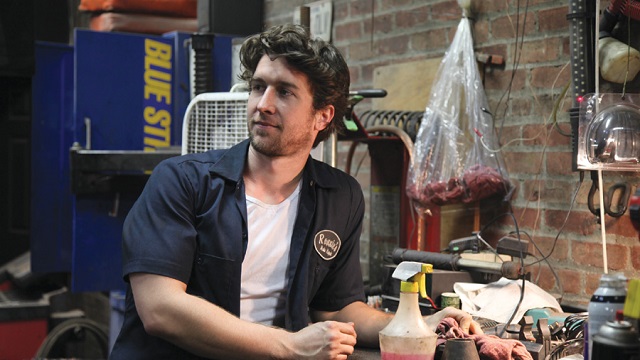Gay culture has a love-hate relationship with straight idealization and the gender roles that includes. One of the most problematic and complex moments Blind Date ever faced was when they paired a recently-divorced-from-a-female just-coming-out butchy-butch with an out-and-proud flaming Gold Star gay. Over dinner, Butchy revealed his divorce from a woman, throwing Gold Star into a wave of shock. In a mix of disgust and glee, Gold Star spent the rest of the date making Butch reconcile his love for cock with his ability to make love to vagina (like actual vagina). In the end, Butchy said if he wanted to date a girl, he would have just stayed married, while Gold Star was all “OMG, he touched a vagina!!!” It’s a segment constructed by straight men meant to reinforce the masculine gender roles that nonetheless ring true in gay culture.
Historically, the community has struggled with the two extremes (recalling the split between the Mattachine Society and the radicals), and is just beginning to reconcile its plurality as more and more heterosexuals accept (and reject) homosexuals for who they are and not for what they fuck. That acceptance by mainstream heteronormative culture tends to come with a price of assimilation; to cite a recent example, last summer’s Do I Sound Gay? documents a gay man blaming the feminine qualities of his voice for why he can’t get fucked on a Friday night. Fourth Man Out, written by a straight dude and directed by another straight dude, is the heterosexual bro-ing of the homosexual coming out story. It seeks to embrace and accept gays, but only on the terms of the bro.
Adam (Evan Todd) is a flannel-and-jeans manly man in a small town. His best friend Chris (Parker Young) is a manly man. Their other two friends (Chord Overstreet and Jon Gabrus) are masculine men. They’re dudes. They’re bros. Except Adam is gay and closeted…until he comes out. By being honest about loving the cock, Adam throws the group dynamics into turmoil as his bro friends come to terms with the realization that Adam wasn’t just “picky” about the women he dates. At its heart, Fourth Man Out is about a group of straight dudes dealing with their assumptions about gays, and learning to accept their brotastic straight-acting gay friend.
There’s also a side story of Adam learning how to deal with being an out of the closet gay man…which is where Fourth Man Out starts falling apart. The core lesson of this section is: If you’re not a bro, you’re not acceptable. The edges of Fourth Man Out are filled with flaming art queens, lecherous old men, creepsters, and a whole slew of bad gay stereotypes that Adam, and the surrogate audience, can reject in a series of humorous dates. The one guy who catches Adam’s interest is another outdoorsy bro type bro with a kayak permanently tied to the roof of his car; everybody else can be ignored. The identity politics at play in this half of the story are the type that fuel the insecurities featured in Do I Sound Gay? This is the cinematic equivalent of Craigslist ads stating “masc4masc. No fats, or femmes. White meat only.”
If Fourth Man Out had merely stuck to the comedy about bros being bros dealing with one of theirs coming out, it would be a fairly successful comedy. Evan Todd and Parker Young have a winning chemistry, director Andrew Nackman has a knack for comic timing, and Aaron Dancik has a good ear for witty banter. The naturalistic visuals make a nice casual backdrop for the lumbersexual-type dude. Broaching a topic that hasn’t been done to death, it would have been a welcome development to the gay coming out story. It’s lively, funny, and paced well. It’s just sad that the bro acceptance also came with the usual bro judgements and bro exclusions.

